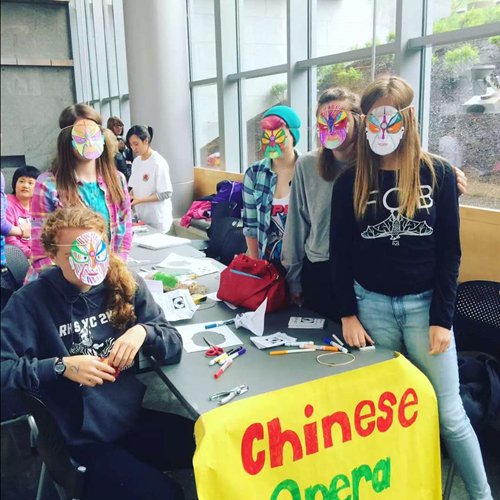Seeking a linguistic edge
By Chen Ximeng Source:Global Times Published: 2017/10/24 17:33:39
More Western elites hiring Chinese nannies and teachers with university degrees to expose their kids to the language at an earlier age

More elite Western families are turning to Chinese nannies and teachers to expose their children to Chinese language and culture at a young age. Photo: VCG
Lei Yuqing, 28, enjoyed teaching Chinese to American children while pursuing her postgraduate degree in education in the US.
"Many of the parents were upper class. They paid a lot of attention to their children's Chinese language learning and were very supportive of my work," said Lei, who has a Bachelor of Arts degree in Chinese language and literature.
Lei said that some Americans think that China is developing very quickly and want their children to be able to understand the language and culture as China continues to rise in the global sphere. Those with the means want their kids to be introduced to the language as early as possible.
According to a September report on mommyish.com, an American parenting website, a San Francisco business family is looking for a Chinese-speaking nanny for $130,000 a year, and many people think it is Facebook CEO Mark Zuckerberg because his second daughter was born in August. The job description said that the person should have three years of experience, basic medical training, a bachelor's degree, and be fluent in Chinese.
Other high-profile families such as Ivanka Trump and Jim Rogers either hired Chinese nannies or sent their kids to Chinese language schools to learn Chinese.
Recent years have seen a growing trend of elite Western parents making their children learn Chinese. Thus, there is an increasing need for Chinese teaching professionals with an advanced degree.

A student practices Chinese characters in Lei Yuqing's class. Photo: Courtesy of Lei Yuqing
Language leverage
During her four years of teaching, Lei found that many elite American families attach great importance to learning Chinese.
She started teaching Chinese part-time at a private high school in Idaho in 2012, during the final year of her postgraduate study. There was no Chinese program at the school, and the principal hired her to create a Chinese program.
After she graduated, she moved to Indiana and taught full-time at a public school for three years. One of her fondest memories of that time was when a family invited her dinner.
"Since Chinese is a minor subject in the school, not many parents would think of inviting the Chinese teacher to their home for dinner," said Lei.
She said during the dinner, the student's parents, who were businesspeople, said he also has a brother who worked in India and that "they want both the brothers to master Chinese so that they own a big advantage in the future."
Cliff Greenhouse, president of Pavillion Agency, a domestic staffing agency in New York, told Metropolitan that his clientele is made up of high net worth families who want nannies who can speak and write proper Chinese. The Chinese-speaking nannies the company represents are well-educated with advanced degrees, many of which are teaching degrees, he said.
According to Cliff, the nannies provide educational guidance and expose the children in their care to Chinese culture, cuisine and arts. They play a role in teaching the children traditional Chinese customs, manners and partner with parents on appropriate discipline.
"Requests for Chinese speakers have been quite robust over the past 10 to 15 years. That demonstrates that this trend is no longer a fad and has taken hold as a mainstream request on par with requests for French, Spanish and Russian speakers," said Cliff. "A Chinese-speaking nanny can earn a minimum of $75,000 yearly, and many salaries are well in excess of $100,000."
He said the reason for the growing demand is that more high-profile families recognize the future economic advantages their children will enjoy after mastering the primary language of the world's most populous nation. He also gave intermarriage between Americans and Chinese as another reason, noting that such families often place a high importance on exposing their child to the Chinese language and culture because it is a part of the child's heritage.


Lei Yuqing's students during a Chinese culture fair at their school in Indiana. Photo: Courtesy of Lei Yuqing
Immersion learning
Five months ago, Cherry Wu, a 28-year-old woman from Taiwan, went to the UK to work as a nanny. She signed up with The Mandarin Nanny, a London-based agency that provides native Chinese-speaking nannies and tutors. She has a bachelor's degree in early childhood education from the National Tsing Hua University in Taiwan and years of teaching experience in Taiwan, Australia and Turkey.
Wu thinks that the major advantages of Chinese-speaking nannies are that they have a good understanding of Chinese culture and can let the children in their care learn through life.
"I think elite families here [in the UK] want a nanny who can make learning Chinese language and culture fun and interesting for their children," she said.
Wu now works with a family where each parent is the president of a real estate company. She speaks to their child in Chinese and teaches the child Chinese characters, new words and songs whenever they do things together.
"The child learns Chinese quicker and more effectively by picking up the language through everyday use, not by cramming," said Wu.
The founder of The Mandarin Nanny, Xia Weipeng told Metropolitan that half of their clients are ethnic Chinese and half are British parents, including football stars, celebrities, business owners and politicians. She said some parents even hire a Chinese-speaking nanny for their six-month-old child so that the child can learn Chinese alongside their native English.
She cited a recent example where a family of doctors wanted to hire a second nanny for their six-month-old child. Xia said the parents have had a nanny for their four-year daughter since she was one and wanted their second child to have a nanny of her own.
Nancy Xu (pseudonym), 25, taught Chinese to second-grade students in the US for 10 months. She obtained master's degree in teaching Chinese to speakers of other languages (MTCSOL) at Beijing Language and Culture University.
Xu said that the school uses a Chinese immersion technique that includes total physical response and communicative language teaching, and it works well. She also thinks that Chinese culture is a good element that can be easily integrated into daily teaching.
"The kids are very interested in Chinese cultures. What impressed me most was the Chinese paper-cutting class. The students were very happy. Some even wanted to bring it home and frame it," said Xu.
Ending the stigma
Although there is an increasing need for Chinese nannies, the development of the industry is still somewhat hampered by a stigma that sees domestic workers as "less than."
Cliff noted that the biggest challenge his company faces is destigmatizing the notion in the Chinese community that there is something wrong about caring for another family's children.
"I'm told that domestic workers in China are looked down on and are embarrassed about the type of work they do. I explain to prospective Chinese-speaking nannies that in the US nannies are partners with the parents and not servants," he said.
He said that by educating the Chinese community about how mainstream being a nanny is in the US is probably the solution. The nanny industry attracts numerous well-educated American nannies who are proud of their chosen career, and many have Ivy League degrees and can earn over $200,000 a year, Cliff said.
Xia said that the UK is facing a shortage of Chinese-speaking nannies. She said the problem is with obtaining a work visa. It is very difficult for a nanny to get a British work visa unless it is under special circumstances. So, many good candidates cannot work legally in the UK. Chinese who can legally work as a nanny in Britain are British passport holders, those who are married to Britons or young people who hold a Tier-5 work visa from Hong Kong or Taiwan, and few of them want to be nannies, Xia said.
Another reason, she said, is that many Chinese disdain the profession, which is quite different from the British mindset.
"In the UK, a nanny is treated the same as nurses or kindergarten teachers. To be a nanny, one needs to take classes including first aid and early childhood psychology. A good nanny can earn 1,000 pounds weekly, which is twice that of the average Briton."
Xia thinks that the stigma needs to be done away with. As more Chinese learn that being a nanny is a respectable job, more would like to do the formal training and become nannies, she said.

Chinese language teachers and nannies think language immersion is the most effective way to teach children Chinese. Photo: VCG
Going online
To cater to the increasing demand for Chinese language skills in foreign countries, online learning platform VIPKID launched Lingo Bus to give kids aged five to 12 access to one-on-one Chinese language services. Over 1,000 people have registered on the app since August, and the number is still growing. The company expects to gain over 50,000 registered users within the next three years, which will require over 10,000 Chinese teachers.
Lei returned to Beijing last year, but she continues to teach foreign kids Chinese through both offline and online platforms. She is currently preparing to open her own Chinese language training company for K-12 students.
"Teaching Chinese in the US, you have to deal with issues such as the visa issue and social integration. While back in China teaching K-12 foreign children, I do not have those concerns," said Lei.
By Chen Ximeng Source:Global Times Published: 2017/10/24 17:33:39
More Western elites hiring Chinese nannies and teachers with university degrees to expose their kids to the language at an earlier age

More elite Western families are turning to Chinese nannies and teachers to expose their children to Chinese language and culture at a young age. Photo: VCG
Lei Yuqing, 28, enjoyed teaching Chinese to American children while pursuing her postgraduate degree in education in the US.
"Many of the parents were upper class. They paid a lot of attention to their children's Chinese language learning and were very supportive of my work," said Lei, who has a Bachelor of Arts degree in Chinese language and literature.
Lei said that some Americans think that China is developing very quickly and want their children to be able to understand the language and culture as China continues to rise in the global sphere. Those with the means want their kids to be introduced to the language as early as possible.
According to a September report on mommyish.com, an American parenting website, a San Francisco business family is looking for a Chinese-speaking nanny for $130,000 a year, and many people think it is Facebook CEO Mark Zuckerberg because his second daughter was born in August. The job description said that the person should have three years of experience, basic medical training, a bachelor's degree, and be fluent in Chinese.
Other high-profile families such as Ivanka Trump and Jim Rogers either hired Chinese nannies or sent their kids to Chinese language schools to learn Chinese.
Recent years have seen a growing trend of elite Western parents making their children learn Chinese. Thus, there is an increasing need for Chinese teaching professionals with an advanced degree.

A student practices Chinese characters in Lei Yuqing's class. Photo: Courtesy of Lei Yuqing
Language leverage
During her four years of teaching, Lei found that many elite American families attach great importance to learning Chinese.
She started teaching Chinese part-time at a private high school in Idaho in 2012, during the final year of her postgraduate study. There was no Chinese program at the school, and the principal hired her to create a Chinese program.
After she graduated, she moved to Indiana and taught full-time at a public school for three years. One of her fondest memories of that time was when a family invited her dinner.
"Since Chinese is a minor subject in the school, not many parents would think of inviting the Chinese teacher to their home for dinner," said Lei.
She said during the dinner, the student's parents, who were businesspeople, said he also has a brother who worked in India and that "they want both the brothers to master Chinese so that they own a big advantage in the future."
Cliff Greenhouse, president of Pavillion Agency, a domestic staffing agency in New York, told Metropolitan that his clientele is made up of high net worth families who want nannies who can speak and write proper Chinese. The Chinese-speaking nannies the company represents are well-educated with advanced degrees, many of which are teaching degrees, he said.
According to Cliff, the nannies provide educational guidance and expose the children in their care to Chinese culture, cuisine and arts. They play a role in teaching the children traditional Chinese customs, manners and partner with parents on appropriate discipline.
"Requests for Chinese speakers have been quite robust over the past 10 to 15 years. That demonstrates that this trend is no longer a fad and has taken hold as a mainstream request on par with requests for French, Spanish and Russian speakers," said Cliff. "A Chinese-speaking nanny can earn a minimum of $75,000 yearly, and many salaries are well in excess of $100,000."
He said the reason for the growing demand is that more high-profile families recognize the future economic advantages their children will enjoy after mastering the primary language of the world's most populous nation. He also gave intermarriage between Americans and Chinese as another reason, noting that such families often place a high importance on exposing their child to the Chinese language and culture because it is a part of the child's heritage.


Lei Yuqing's students during a Chinese culture fair at their school in Indiana. Photo: Courtesy of Lei Yuqing
Immersion learning
Five months ago, Cherry Wu, a 28-year-old woman from Taiwan, went to the UK to work as a nanny. She signed up with The Mandarin Nanny, a London-based agency that provides native Chinese-speaking nannies and tutors. She has a bachelor's degree in early childhood education from the National Tsing Hua University in Taiwan and years of teaching experience in Taiwan, Australia and Turkey.
Wu thinks that the major advantages of Chinese-speaking nannies are that they have a good understanding of Chinese culture and can let the children in their care learn through life.
"I think elite families here [in the UK] want a nanny who can make learning Chinese language and culture fun and interesting for their children," she said.
Wu now works with a family where each parent is the president of a real estate company. She speaks to their child in Chinese and teaches the child Chinese characters, new words and songs whenever they do things together.
"The child learns Chinese quicker and more effectively by picking up the language through everyday use, not by cramming," said Wu.
The founder of The Mandarin Nanny, Xia Weipeng told Metropolitan that half of their clients are ethnic Chinese and half are British parents, including football stars, celebrities, business owners and politicians. She said some parents even hire a Chinese-speaking nanny for their six-month-old child so that the child can learn Chinese alongside their native English.
She cited a recent example where a family of doctors wanted to hire a second nanny for their six-month-old child. Xia said the parents have had a nanny for their four-year daughter since she was one and wanted their second child to have a nanny of her own.
Nancy Xu (pseudonym), 25, taught Chinese to second-grade students in the US for 10 months. She obtained master's degree in teaching Chinese to speakers of other languages (MTCSOL) at Beijing Language and Culture University.
Xu said that the school uses a Chinese immersion technique that includes total physical response and communicative language teaching, and it works well. She also thinks that Chinese culture is a good element that can be easily integrated into daily teaching.
"The kids are very interested in Chinese cultures. What impressed me most was the Chinese paper-cutting class. The students were very happy. Some even wanted to bring it home and frame it," said Xu.
Ending the stigma
Although there is an increasing need for Chinese nannies, the development of the industry is still somewhat hampered by a stigma that sees domestic workers as "less than."
Cliff noted that the biggest challenge his company faces is destigmatizing the notion in the Chinese community that there is something wrong about caring for another family's children.
"I'm told that domestic workers in China are looked down on and are embarrassed about the type of work they do. I explain to prospective Chinese-speaking nannies that in the US nannies are partners with the parents and not servants," he said.
He said that by educating the Chinese community about how mainstream being a nanny is in the US is probably the solution. The nanny industry attracts numerous well-educated American nannies who are proud of their chosen career, and many have Ivy League degrees and can earn over $200,000 a year, Cliff said.
Xia said that the UK is facing a shortage of Chinese-speaking nannies. She said the problem is with obtaining a work visa. It is very difficult for a nanny to get a British work visa unless it is under special circumstances. So, many good candidates cannot work legally in the UK. Chinese who can legally work as a nanny in Britain are British passport holders, those who are married to Britons or young people who hold a Tier-5 work visa from Hong Kong or Taiwan, and few of them want to be nannies, Xia said.
Another reason, she said, is that many Chinese disdain the profession, which is quite different from the British mindset.
"In the UK, a nanny is treated the same as nurses or kindergarten teachers. To be a nanny, one needs to take classes including first aid and early childhood psychology. A good nanny can earn 1,000 pounds weekly, which is twice that of the average Briton."
Xia thinks that the stigma needs to be done away with. As more Chinese learn that being a nanny is a respectable job, more would like to do the formal training and become nannies, she said.

Chinese language teachers and nannies think language immersion is the most effective way to teach children Chinese. Photo: VCG
Going online
To cater to the increasing demand for Chinese language skills in foreign countries, online learning platform VIPKID launched Lingo Bus to give kids aged five to 12 access to one-on-one Chinese language services. Over 1,000 people have registered on the app since August, and the number is still growing. The company expects to gain over 50,000 registered users within the next three years, which will require over 10,000 Chinese teachers.
Lei returned to Beijing last year, but she continues to teach foreign kids Chinese through both offline and online platforms. She is currently preparing to open her own Chinese language training company for K-12 students.
"Teaching Chinese in the US, you have to deal with issues such as the visa issue and social integration. While back in China teaching K-12 foreign children, I do not have those concerns," said Lei.